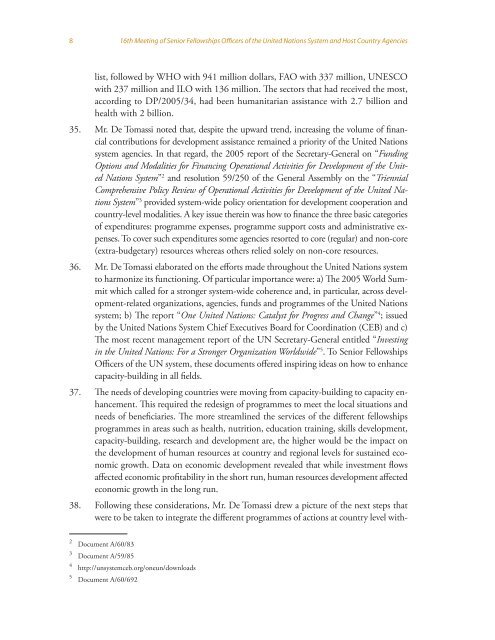16th Meeting of Senior Fellowships Officers of the ... - Development
16th Meeting of Senior Fellowships Officers of the ... - Development
16th Meeting of Senior Fellowships Officers of the ... - Development
Create successful ePaper yourself
Turn your PDF publications into a flip-book with our unique Google optimized e-Paper software.
<strong>16th</strong> <strong>Meeting</strong> <strong>of</strong> <strong>Senior</strong> <strong>Fellowships</strong> <strong>Officers</strong> <strong>of</strong> <strong>the</strong> United Nations System and Host Country Agencies<br />
list, followed by WHO with 941 million dollars, FAO with 337 million, UNESCO<br />
with 237 million and ILO with 136 million. The sectors that had received <strong>the</strong> most,<br />
according to DP/2005/34, had been humanitarian assistance with 2.7 billion and<br />
health with 2 billion.<br />
35. Mr. De Tomassi noted that, despite <strong>the</strong> upward trend, increasing <strong>the</strong> volume <strong>of</strong> financial<br />
contributions for development assistance remained a priority <strong>of</strong> <strong>the</strong> United Nations<br />
system agencies. In that regard, <strong>the</strong> 2005 report <strong>of</strong> <strong>the</strong> Secretary-General on “Funding<br />
Options and Modalities for Financing Operational Activities for <strong>Development</strong> <strong>of</strong> <strong>the</strong> United<br />
Nations System” and resolution 59/250 <strong>of</strong> <strong>the</strong> General Assembly on <strong>the</strong> “Triennial<br />
Comprehensive Policy Review <strong>of</strong> Operational Activities for <strong>Development</strong> <strong>of</strong> <strong>the</strong> United Nations<br />
System” provided system-wide policy orientation for development cooperation and<br />
country-level modalities. A key issue <strong>the</strong>rein was how to finance <strong>the</strong> three basic categories<br />
<strong>of</strong> expenditures: programme expenses, programme support costs and administrative expenses.<br />
To cover such expenditures some agencies resorted to core (regular) and non-core<br />
(extra-budgetary) resources whereas o<strong>the</strong>rs relied solely on non-core resources.<br />
36. Mr. De Tomassi elaborated on <strong>the</strong> efforts made throughout <strong>the</strong> United Nations system<br />
to harmonize its functioning. Of particular importance were: a) The 2005 World Summit<br />
which called for a stronger system-wide coherence and, in particular, across development-related<br />
organizations, agencies, funds and programmes <strong>of</strong> <strong>the</strong> United Nations<br />
system; b) The report “One United Nations: Catalyst for Progress and Change” ; issued<br />
by <strong>the</strong> United Nations System Chief Executives Board for Coordination (CEB) and c)<br />
The most recent management report <strong>of</strong> <strong>the</strong> UN Secretary-General entitled “Investing<br />
in <strong>the</strong> United Nations: For a Stronger Organization Worldwide” . To <strong>Senior</strong> <strong>Fellowships</strong><br />
<strong>Officers</strong> <strong>of</strong> <strong>the</strong> UN system, <strong>the</strong>se documents <strong>of</strong>fered inspiring ideas on how to enhance<br />
capacity-building in all fields.<br />
37. The needs <strong>of</strong> developing countries were moving from capacity-building to capacity enhancement.<br />
This required <strong>the</strong> redesign <strong>of</strong> programmes to meet <strong>the</strong> local situations and<br />
needs <strong>of</strong> beneficiaries. The more streamlined <strong>the</strong> services <strong>of</strong> <strong>the</strong> different fellowships<br />
programmes in areas such as health, nutrition, education training, skills development,<br />
capacity-building, research and development are, <strong>the</strong> higher would be <strong>the</strong> impact on<br />
<strong>the</strong> development <strong>of</strong> human resources at country and regional levels for sustained economic<br />
growth. Data on economic development revealed that while investment flows<br />
affected economic pr<strong>of</strong>itability in <strong>the</strong> short run, human resources development affected<br />
economic growth in <strong>the</strong> long run.<br />
38. Following <strong>the</strong>se considerations, Mr. De Tomassi drew a picture <strong>of</strong> <strong>the</strong> next steps that<br />
were to be taken to integrate <strong>the</strong> different programmes <strong>of</strong> actions at country level with-<br />
<br />
<br />
<br />
<br />
Document A/60/83<br />
Document A/59/85<br />
http://unsystemceb.org/oneun/downloads<br />
Document A/60/692

















